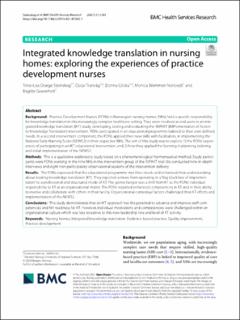| dc.contributor.author | Steinskog, Trine-Lise Dræge | |
| dc.contributor.author | Tranvåg, Oscar | |
| dc.contributor.author | Ciliska, Donna | |
| dc.contributor.author | Nortvedt, Monica Wammen | |
| dc.contributor.author | Graverholt, Birgitte | |
| dc.date.accessioned | 2022-02-03T09:25:47Z | |
| dc.date.available | 2022-02-03T09:25:47Z | |
| dc.date.created | 2021-12-07T08:53:14Z | |
| dc.date.issued | 2021 | |
| dc.identifier.citation | Steinskog, T.-L. D., Tranvåg, O., Ciliska, D., Nortvedt, M. W., & Graverholt, B. (2021). Integrated knowledge translation in nursing homes: exploring the experiences of practice development nurses. BMC Health Services Research, 21(1), 1283. | en_US |
| dc.identifier.issn | 1472-6963 | |
| dc.identifier.uri | https://hdl.handle.net/11250/2976789 | |
| dc.description.abstract | Background
Practice Development Nurses (PDNs) in Norwegian nursing homes (NHs) hold a specific responsibility for knowledge translation in this increasingly complex healthcare setting. They were involved as end users in an integrated knowledge translation (IKT) study, developing, testing and evaluating the IMPAKT (IMPlementation of Action to Knowledge Translation) intervention. PDNs participated in an educational programme tailored to their own defined needs. In a second intervention component, the PDNs applied their new skills with facilitation, in implementing the National Early Warning Score (NEWS2) in their respective NHs. The aim of this study was to explore 1) the PDNs’ experiences of participating in an IKT educational intervention, and 2) how they applied the learning in planning, tailoring and initial implementation of the NEWS2.
Methods
This is a qualitative exploratory study based on a phenomenological hermeneutical method. Study participants were PDNs working in the nine NHs in the intervention group of the IMPAKT trial. We conducted nine in-depth interviews and eight non-participatory observational sessions of the intervention delivery.
Results
The PDNs expressed that the educational programme met their needs and enhanced their understanding about leading knowledge translation (KT). They reported a move from operating in a “big black box of implementation” to a professional and structured mode of KT. The gamechanger was a shift from KT as the PDNs’ individual responsibility to KT as an organizational matter. The PDNs reported enhanced competencies in KT and in their ability to involve and collaborate with others in their facility. Organizational contextual factors challenged their KT efforts and implementation of the NEWS2.
Conclusions
This study demonstrates that an IKT approach has the potential to advance and improve staff competencies and NH readiness for KT. However, individual motivations and competencies were challenged within an organizational culture which was less receptive to this new leadership role and level of KT activity. | en_US |
| dc.language.iso | eng | en_US |
| dc.publisher | BMC | en_US |
| dc.rights | Navngivelse 4.0 Internasjonal | * |
| dc.rights.uri | http://creativecommons.org/licenses/by/4.0/deed.no | * |
| dc.title | Integrated knowledge translation in nursing homes: exploring the experiences of practice development nurses | en_US |
| dc.type | Peer reviewed | en_US |
| dc.type | Journal article | en_US |
| dc.description.version | publishedVersion | en_US |
| dc.rights.holder | © The Author(s) 2021. | en_US |
| dc.subject.nsi | VDP::Medisinske Fag: 700 | en_US |
| dc.source.volume | 21 | en_US |
| dc.source.journal | BMC Health Services Research | en_US |
| dc.source.issue | 1 | en_US |
| dc.identifier.doi | 10.1186/s12913-021-07282-7 | |
| dc.identifier.cristin | 1965361 | |
| dc.relation.project | Norges forskningsråd: 256569 | en_US |
| dc.source.articlenumber | 1283 | en_US |
| cristin.ispublished | true | |
| cristin.fulltext | original | |
| cristin.qualitycode | 2 | |

